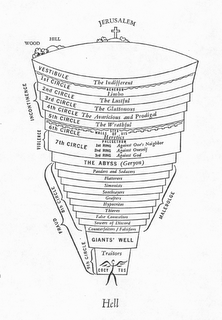129th Street. Dante's "Inferno" and Matthew Pearl's "The Dante Club"

Folks,
I know once again I am late for an update. Well, at least this one is not a month's late. I am officially into my holidays and what this means to all of you is that updates is gonna come to you at a more regular basis. We might be back on track with one page a week! And on good weeks, even two updates a week.
During the past one month, in case you're wondering what I have been up to, I have been trying to complete my near endless reports and of course, reading. What am I reading you might ask? I am reading TWO authors at the same time actually. One, Dante and the other Matthew Pearl.
Why Dante? And why now? All right for those of you who doesn't have a slightest idea of who Dante is, he is poet in the 14th century who wrote "The Divine Comedy" or "La Divina Comedia" in Italian. "La Divina Comedia" consists of three parts, "Inferno" (Hell), "Purgatorio" (Purgatory) and "Paradisio" (Paradise/Heaven). The poem details Dante's trip through this three stages of afterlife. One of his most powerful and influential work is arguably "Inferno" where he details the five separate layers of hell, Upper Hell, Lower Hell, Nether Hell One, Nether Hell Two and Nether Hell Three. Each layer consists of separate circles that has punishments in store for respective sinners. The diagram above gives a rough idea of what hell looks like.
Hell, according to Dante, operates by the principle of "CONTRAPASSO", or counter punishment. The act committed by the sinners becomes the force that punishes them. For example, in the Second Circle of Upper Hell, Dante finds the Lustful. He sees people being blown about by a dark wind. When he asks his mentor Virgil why are these people being flung about in the wind, Virgil explains that these people, are the adulterers. When alive they are unable to stick to one partner. They move from partners to partners, and in death, their inability to keep "still" becomes a force that punishes them. Since they can't keep still when they were alive, in contrapasso, they will NEVER get to be still ever.
Even if one doesn't believe Dante's vision of hell, one cannot ignore the beautiful poetry in which "Inferno" is written in. The entire poem is written in "terza rima" - a poem with three lines per stanza. The last word of the first line of the stanza rhymes with the last word of the third line of the stanza. The last word of the second line of the stanza will rhyme with the last word of the first line of the next stanza.
Matthew Pearl is a summa cum laude graduate in English Literature from Harvard University, and he is a huge fan of Dante. In his work, "The Dante Club", he details a series of killings set in 19th century Boston that are modeled after the punishments written in Dante's "Inferno". At that time Dante has not yet been fully translated in America, and it is up to four Dante scholars to find out who exactly is reading Dante and carrying out the killings.
I could go on forever about Dante and how great he is - but to really experience his greatness, you need to read it. Read "The Dante Club" if you find "Inferno" too turgid for your taste. It will change your life.
